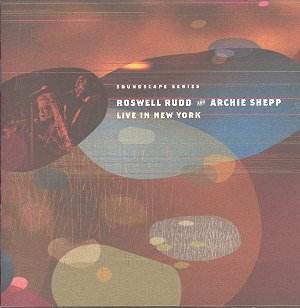ROSWELL RUDD AND ARCHIE SHEPP
Live in New York
 Emarcy 013482-2
Emarcy 013482-2
Crotchet

There is a lot of history contained in this album. With its line-up of Rudd,
Shepp, Reggie Workman on bass, Andrew Cyrille on drums, Grachan Moncur III
on second trombone, and poet Amiri Baraka, I had to check when it was recorded.
(It was actually recorded in September 2000, not in the mid 60s as the personnel
might lead you to suspect.) Shepp, Rudd and Workman played together on the1964
album "Four for Trane", and Shepp and Rudd were joined by Moncur in 1966
on "Mama Too Tight", both classic Shepp albums. Baraka joined the New York
Art Quartet (including Rudd) on their fine 1964 ESP album. So, based on past
glories, the line-up raises expectations of great things.
On the other hand, for the past quarter of a century Shepp has not been the
iconoclast he was in the 60s, opting instead for a rather conservative approach,
including some less than impressive blues-based vocal performances. Rudd
has remained at the cutting edge (including excellent work with Steve Lacy
and with Elton Dean among others) but, before this album, he and Shepp had
not played together for 33 years.
The album was recorded live at The Jazz Standard in New York City. After
some initial jousting on Keep Your Heart Right, Rudd's Acute Motelitis
provides a perfect blowing vehicle for all concerned. While not having
the openness of some 60s pieces, there is plenty of room to stretch out,
that is amply exploited. Unfortunately, this is followed by Steam,
on which Shepp gives a vocal performance that is clearly very personal and
well-intentioned (dedicated to his murdered teenager cousin) but leaden.
It destroys the album's momentum and threatens to kill it totally. Another
Rudd piece Pazuzu gets things back on track, again with great blowing,
particularly by Rudd himself. After an atmospheric Bakara piece, Shepp redeems
himself on Ujamma, with a fine sax solo and then some piano accompaniment
while others solo. Rudd's Slide by Slide is one of the album's highlights,
featuring the Rudd and Moncur's trombones playing tag with Shepp on sax,
the three intertwining effectively. Déjà-vu is another
Shepp vocal performance (of which the less said, the better). The album finishes
on a high with Hope No. 2 (for Elmo Hope).
Overall, this album is a success. Its weaknesses centre around Shepp's singing,
which is just not right in this context. The album's greatest strengths occur
when Rudd sets the agenda and draws the best out of Shepp the saxophonist,
producing some of his best recent playing. This is far more than a trip down
memory lane to the 60s, and shows that the pairing (indeed, the entire band)
has plenty of exciting music in them.
John Eyles